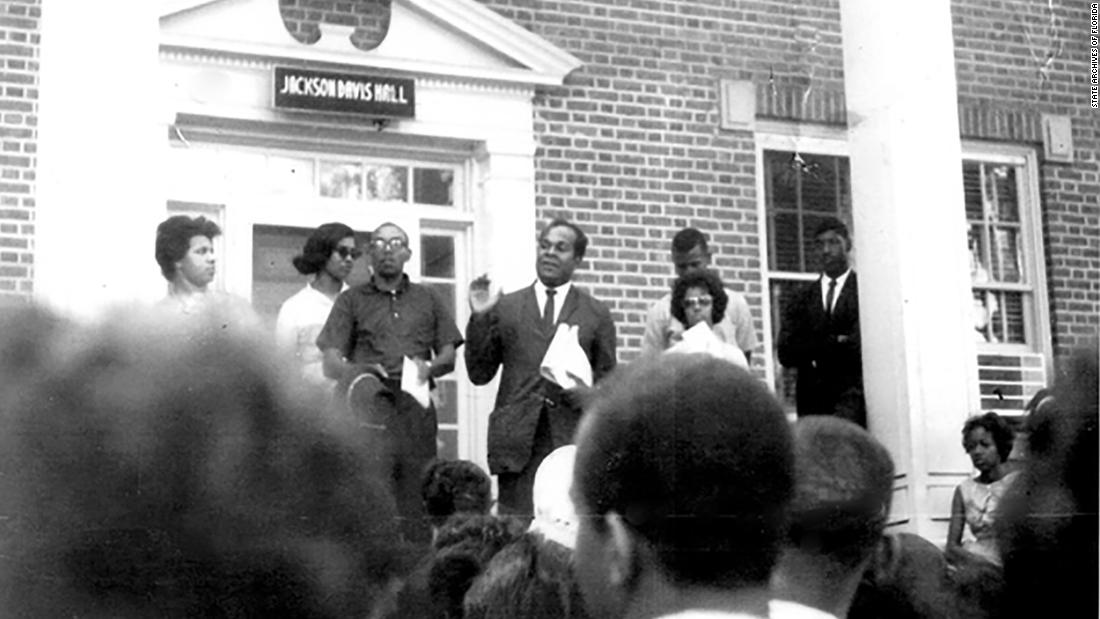Products You May Like
(CNN) — Florida is my father’s chosen state. He often jokes that he came to Tallahassee to attend FAMU (Florida Agricultural and Mechanical University) Law School in 1960 after he saw my mother’s picture in “Jet,” the digest published by Johnson Publishing Company to cover news and general interest stories for African-American readers.
True story, but not the full story.
The student sit-in movement that started in Greensboro, North Carolina, on February 1, 1960, was spreading across the South. My father, John Due Jr., had been studying at Indiana State University but felt that the student activism there was too muted and students were constrained by conservative values even in the black community.
Congress of Racial Equality
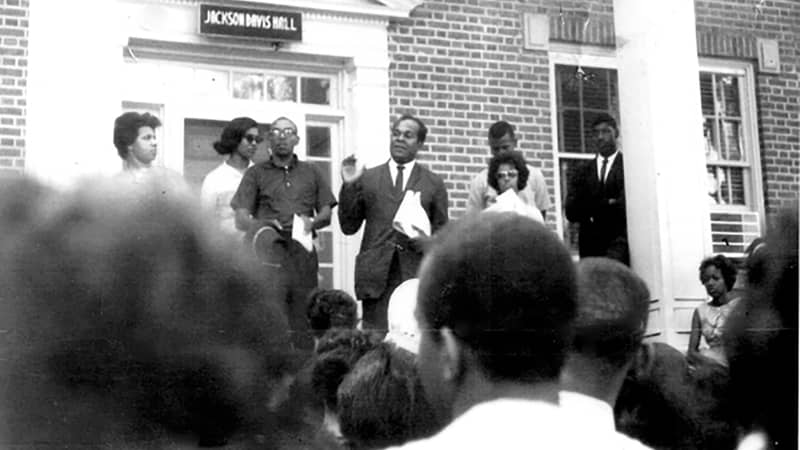
John D. Due Jr. speaks to students at FAMU in Tallahassee in 1963.
State Archives of Florida
My mother, Patricia Stephens Due, along with my Aunt Priscilla Stephens, as FAMU students had formed a CORE (Congress of Racial Equality) chapter in Tallahassee.
They knew that Florida was not the idyllic paradise it portrayed itself to be, and they wanted to fight against racial discrimination and segregation in the city of Tallahassee and the state.
Their actions led to their arrests as well as that of the other participants, including high school student Henry Steele, son of Rev. CK Steele, leader of the successful Tallahassee bus boycott in 1956.
When they were convicted the next month by a court where they were openly called “nigger,” several of them followed a “Jail No Bail” strategy, deciding to stay in jail instead of paying a fine to fund segregation.
Praise from Dr. King
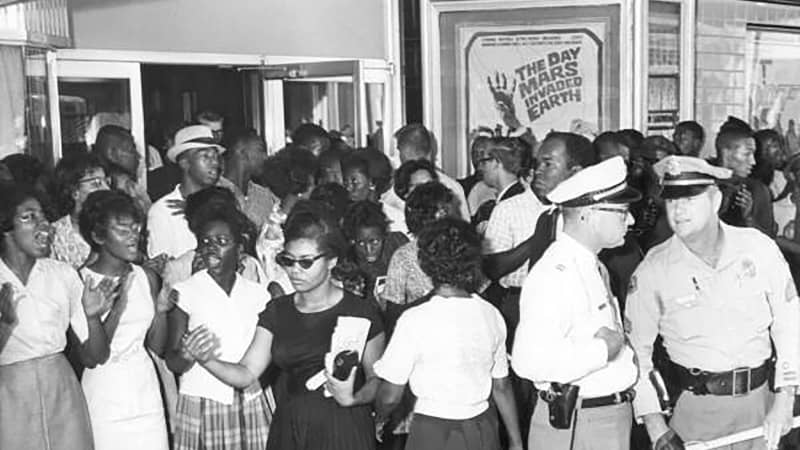
Picketing at the State Theater in Tallahassee in 1963; Patricia Due Stephens (in the black dress) and John Due (his head is visible behind the officer) are both pictured.
State Archives of Florida
This first jail-in of the nation garnered my mother and aunt national attention as the leaders. Dr. King had asked students to fill the jails and sent them this telegram:
“I have just learned of your courageous willingness to go to jail instead of paying fines for your righteous protest against segregated eating facilities. Through this decision you have again proven that there is nothing more majestic and sublime than the determined courage of individuals willing to suffer and sacrifice for the cause of freedom … I assure you that your valiant witness is one of the glowing epics of our time and you are bringing all of America nearer the threshold of the world’s bright tomorrows.”
Spreading the word
Baseball legend Jackie Robinson published their letters from jail. When they were released after serving 49 days of a 60 day sentence in Leon County jail, they went on a national speaking tour, bringing attention to what was going on in Tallahassee and across the South, hosted by the likes of Chicago publishing magnate John H. Johnson, First Lady Eleanor Roosevelt and singer Harry Belafonte.
According to Pulitzer Prize-winning journalist Anthony Lewis, “[t]he belief by civil rights leaders that non-violent resistance could overthrow white supremacy in the south was premised on the existence of an audience — the American public — whose conscience could be aroused and outraged … and that belief, in turn, depended on a press that would tell the story.”
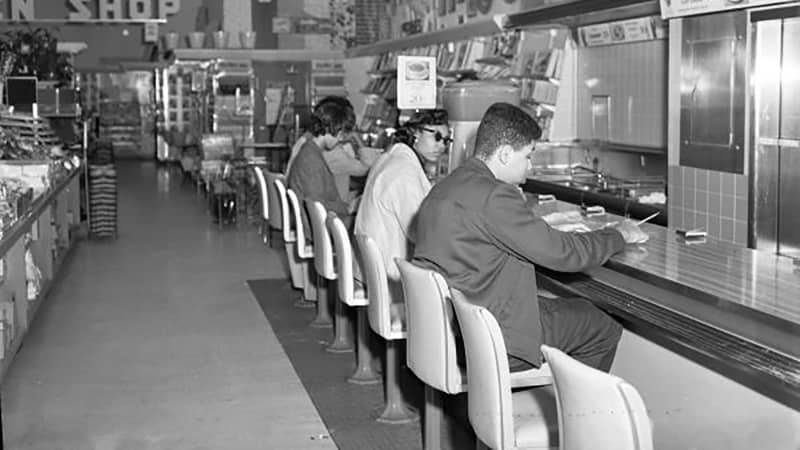
Image of the non-violent direct action of the Woolworth’s sit-in in 1960.
State Archives of Florida
And so it did. And that is how my father saw my Mom’s picture in “Jet.” It was not only her looks which moved him. He was moved by “the freedom spirit” she and the other activists in Tallahassee exhibited.
Thus, my father joined the movement and protests continued, at the movie theater, at other eating facilities like McCrory’s, at the Tallahassee regional airport, in the streets.
Freedom spirit honored
The city of Tallahassee and Leon County have reverently captured the freedom spirit of these foot soldiers and have forever memorialized it in the Heritage Walk, or Sidewalk Memorial.
Located outside of what used to be McCrory’s, it is a place where you can literally walk in the footsteps of history. The memorial shows that the civil rights movement was not about one person but about all of the “ordinary people who did extraordinary things” to impact change, as my mother liked to say.
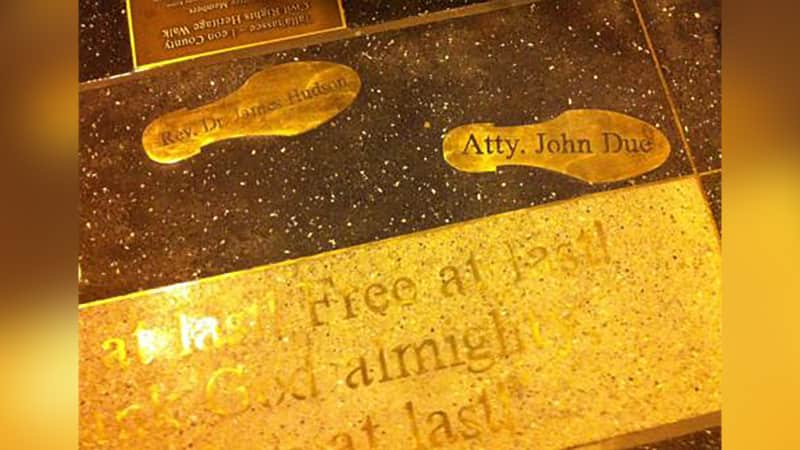
Patricia Stephens Due’s footprints in the Tallahassee Sidewalk Memorial commemorate history.
Johnita Due
Facing a hard history
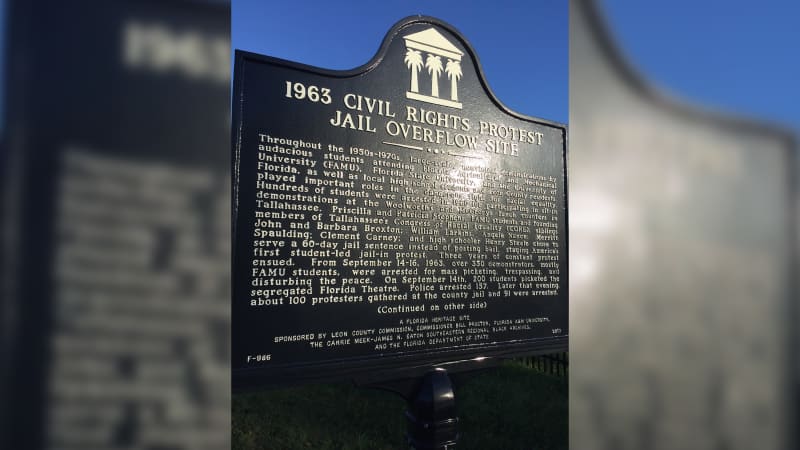
The North Florida Fairgrounds now include a civil rights marker, which the author says her mother would be pleased to see.
Johnita Due
Dr. Murell Dawson of the FAMU Meek-Eaton Black Archives was instrumental in making it happen. My mother would also be pleased to learn that the city and county have installed fourteen civil rights monuments in Cascades Park, Tallahassee’s newest social and recreational center.
My mother would be proud to know that the significant role played by activists in Tallahassee in the past is being remembered and celebrated to inspire people to impact change today and into the future.
And she would say: “Well done.”
Johnita P. Due is Senior Vice President and Chief Diversity & Inclusion Officer for WarnerMedia News and Sports, the parent company of CNN.
